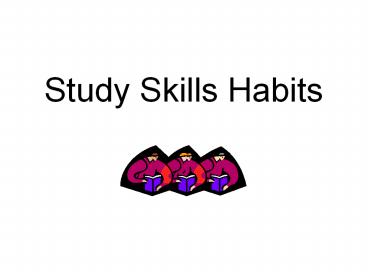Study%20Skills%20Habits - PowerPoint PPT Presentation
Title:
Study%20Skills%20Habits
Description:
Title: Study Skills Habits Author: GCHS CTE Last modified by: Jennifer Ferguson Created Date: 10/11/2005 4:20:17 PM Document presentation format: On-screen Show (4:3) – PowerPoint PPT presentation
Number of Views:198
Avg rating:3.0/5.0
Title: Study%20Skills%20Habits
1
Study Skills Habits
2
Effective Study Skills/Habits
- a.) Keep a course notebook.
- b.) Clearly understand the assignment and
follow instructions. - c.) Keep assignments up to date.
- d.) Schedule a time and place
- to study.
- e.) Dont procrastinate.
- f.) Study in short segments
- instead of cramming.
- g.) Complete hard assignments
first. - h.) Participate in class
- activities/discussions.
3
Poor Study Habits
- a.) Completing easiest
- assignments first
- b.) Studying around loud
- noise/distraction
- c.) Studying in a cluttered
- environment
- d.) Letting your thoughts wander
- e.) Studying when tired or hungry
- f.) Failing to reflect on the
- meaning of the assignment
- g.) Staying up late to study
- h.) Cramming
4
Test Taking Strategies
- General Test Preparation Strategies
- Stay healthy and well-rested (Remember Maslows
Hierarchy.). - Avoid over-studying.
- Develop a plan of action.
- Test Taking Strategies
- 1.) Relax during test administration..
- 2.) Glance over the test number of questions,
format, points per - question/section, etc.
- 3.) Read instructions completely.
- 4.) Answer the easiest questions first
- 5.) Eliminate answers.
- 6.) Go with your first guess.
- 7.) Check answers before turning the test in.
5
Writing Strategies
- Write legibly.
- Remember the 3 Cs Clear, Concise, and
Convincing. - Write simply in an understandable format.
- Proofread your work.
6
Reading Comprehension Strategies
- Scan the chapter
- Use the TEACH format.
- Think What will this chapter be about? What do I
need to learn from this chapter? - Explain Decide what you already know about the
chapter. - Ask Who?, What?, Where?, When?, What?
- Clues Title, Key words, Headings, Illustrations
- Handwrite chapter highlights Definitions,
Formulas, Main Concepts
7
Note-taking Strategies
- Listen carefully.
- Write well.
- Follow the leader.
- Copy from the board.
- Record repeated phrases.
- Record topics of emphasis (teachers voice tone,
repeating of ideas/phrases, pace). - Organize your notes.
- Outline
- Diagram
- Compare notes.
- Review notes within 48 hours.
8
Memory Strategies
- Employ listening and concentration skills.
- Repeat verbally or in writing.
- Associate material with the familiar (analogies).
- Employ mnemonic devices.
- Use the first letters of the material/list to
make a silly sentence/story. - Create an acronym.
9
Concentration Strategies
- Avoid distraction - keep a single focus.
- Concentrate on the present task.
- Study in a quiet relaxing environment.
- Take breaks as needed/avoid over-studying.
10
Listening Strategies
- Stop talking.
- Practice active listening.
- Focus on teacher.
- Repeat messages back to the teacher to determine
understanding.
11
Evaluation of Personal Study Habits/Test Taking
Strategies
- Identification of current practices/habits
- Identification of current academic performance
level (progress reports, report card, transcript) - Identification of effective/ineffective
strategies - Determination of areas for improvement
12
Development of Personal Learning Plan
- Components
- Location
- Time
- Goals
- Strategies
- a. Overall
- b. Course specific































